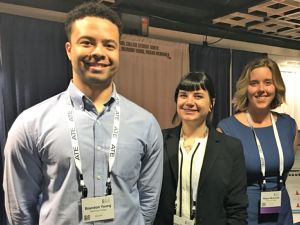
Nanotech research helped three Saint Paul College alumni move closer to their STEM career goals.
Saint Paul College students who enroll in the Science Instrumentation Technician associate degree program at the Minnesota Community and Technical College have the opportunity to work on authentic research projects thanks to the collaborative with industry the college formed with the support of a National Science Foundation Advanced Technological Education grant. (DUE #136157)
“It helped me immerse myself in the field so I felt more comfortable,” said Tasha Spencer of her research experience. She did her capstone course research at the University of Minnesota’s Nano Center where she studied the effects of using hafnium oxide particles as micro needles for drug delivery.
Now an environmental engineering student at the university, Spencer is focusing on water pollution-related public health issues.
Although her interest in water pollution remedies don’t connect directly to the research she did while earning her associate degree at St. Paul College, she said the experience of conducting authentic research provided several important takeaways: It taught her how to create and execute a research project, and it boosted her confidence in her ability to work on complex laboratory equipment and to interact with lab personnel.
Spencer and two other St. Paul College alumni—Brandon Young and Megan McDonald—talked about their research experiences during a showcase session at the 2017 Advanced Technological Education Principal Investigators Conference in Washington, D.C.
Young, who had already earned a bachelor’s degree before taking the instrumentation courses at St. Paul College, analyzed the tannin levels in grapes taken at various times from the north and south sides of a Minnesota vineyard. Young said the results will help the vintner optimize his work in the future. He also thinks his research experience strengthened his application to physician assistant programs.
McDonald, who works as a hospital pharmacy technician while pursuing a bachelor’s degree, anticipates her experiments with gold nanoparticles will enhance her graduate school applications.
“It was a huge help to me to have this kind of hands-on experience with bench science. Ultimately, I want to do a master’s of public health, PhD [in] epidemiology. Having this project, this opportunity was huge, to be able work in a lab. And to do that at the community college-level really kind of set me apart from my peers,” she said.

 Subscribe
Subscribe


 See More ATE Impacts
See More ATE Impacts

Comments
There are no comments yet for this entry. Please Log In to post one.